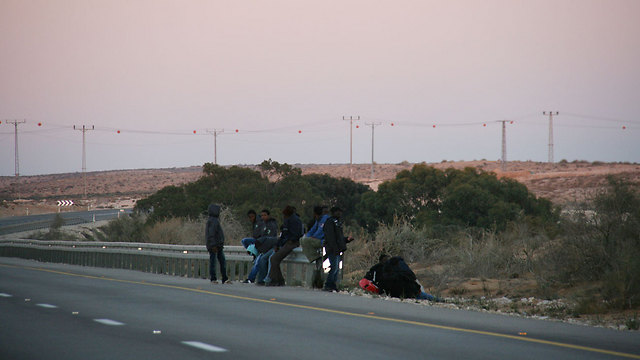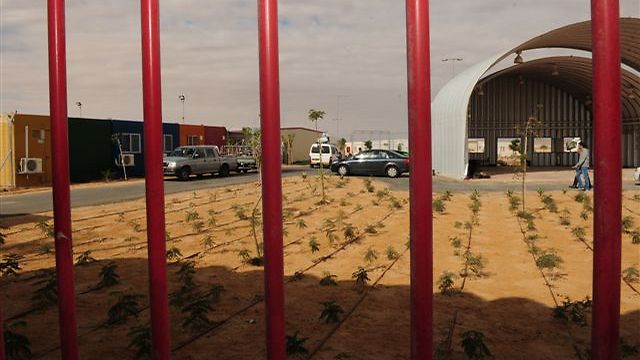Some 56 asylum seekers held at the Holot facility in the Negev left the site during the weekend and have yet to return.
As part of their first phase of operations, the facility, which opened on Thursday last week, took in 480 Sudanese and Eritrean asylum seekers previously held at the Saharonim prison.
Related stories:
- New migrants' detention facility gears for opening
- State transfers 50 migrants to new detention center
- Knesset approves Infiltration Prevention Bill
In line with the new Prevention of Infiltration Law's amendment, which was ratified by the Knesset last week, the new Holot facility is designated as open during the day and closed at night.
The detainees are permitted to leave the premises, given that they check in for attendance three times a day and return at night.
Prior to the official opening of the facility, sources in the government told Ynet they were concerned that detainees would flee.
Migrants and asylum seekers who left the detention facility arrived during the day to the central bus station in Beersheba. "We're going to Tel Aviv and not coming back," some said.
Others complained that the bus companies aren't reinforcing the number of buses. They said, "We've been in Beersheba for hours, there are no busses back (to the facility) and they will put us in jail, why?"
Several migrants walked the whole way to Beersheba on foot, while others arrived by bus. "They give us NIS 150 ($43) for three days. A one-way bus ticket costs NIS 18 ($5). In three days I'll be out of money just from the buses. What about food? Water? Are we animals?" asked Ahmed, a Sudanese refugee.
Officials with the Administration of Population and Immigration said on Sunday: "The Administration will operate under law in its treatment of infiltrators who will not return to the open facility."
Interior Ministry officials said they would attempt to locate and arrest all those who escaped from the facility.
Following the amendment made to the law, sanctions will be taken against asylum seekers that leave the facility. If located, they will be re-incarcerated at the Saharonim facility.
Abed al-Naim, an asylum seeker, 24, who walked to the Beersheba along with other Holot detainees, said that transferring him and his friends to the new open facility was futile, and that the option of leaving the facility during the day is meaningless as there is no regulated transportation anywhere.
"We are refugees and we should be treated as such. At the very least, we ask that our asylum requests be processed," al-Naim said.
According to MK Dov Khenin, "The asylum seekers' departure from the 'open' facility was completely expected. With no work opportunities, there's no reason why someone should stay in such a facility, which is essentially a prison for all intents and purposes other than the possibility to step out."
The MK noted that "this teaches us, once again, that the government does not offer any real solutions to the crisis of asylum seekers and that instead of solutions it just moves from one populist and offensive response to another."
The Holot center was set up by the government as an alternative following a High Court ruling that determined that no asylum seekers and infiltrators are to be kept in a closed facility for more than three years.
The new facility in Holot that is, as mentioned, designated 'open', was erected near the Saharonim prison.
As of now, the Holot facility houses asylum seekers transferred from Saharonim; the site has the ability to house 330 more people, and can potentially house thousands more.
In the coming days, more asylum seekers are expected to be admitted to the Holot facility; those called upon are probably asylum seekers who entered Israel illegally years ago.
- Receive Ynetnews updates
directly to your desktop























